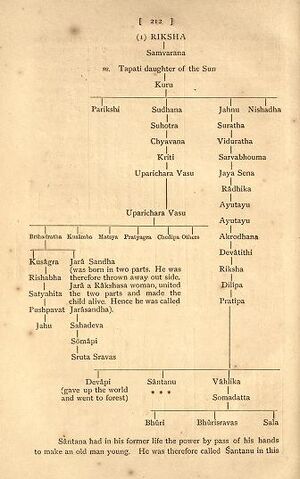Samvarana
Samvarana (संवरण) (Sanvarana) was a king in the Puru and Pandavas (Aila dynasty).
Genealogy of Vahlika

Genealogy of Bahlika as per Bhagavata Purana[1] Riksha → Samvarana (m. Tapati) → Kuru → Jahnu → Suratha → Viduratha → Saryabhauma → Jaya Sena → Radhika → Ayutayu → Akrodhana → Devatithi → Riksha → Dilipa → Pratipa → Vahlika → Somadatta → Bhuri + Bhurisravas + Sala
Genealogy of Puru
Adi Parva, Mahabharata/Mahabharata Book I Chapter 89 tells us the History of Puru and Pandavas (Aila dynasty).
Genealogy of Puru : Puru (wife: Paushti) → 1.Pravira, 2.Iswara, and 3. Raudraswa
1. Pravira (w:Suraseni) → Manasyu (w:Sauviri) → Subhru, Sahana, and Vagmi.
3. Raudraswa (w:Misrakesi) → Richeyu (=Anadhrishti) (+9 more) → Matinara → Tansu (+3 more) → Ilina (w:Rathantara → Dushmanta (w:Sakuntala) (+4 more) → Bharata → Bhumanyu (Pushkarini) → Suhotra (w:Aikshaki) (+5 more) → Ajamidha (w: Dhumini) → Riksha → Samvarana (w:Tapati) (migrated to Sindhu River) → Kuru (w:Vahini) → Abhishyavanta → Parikshit → Janamejaya → Dhritarashtra (+Pandu & 6 more) → Pratipa (+2 more) → Santanu
Migration of Samvarana to Sindhu
It is interesting to note that Samvarana migrated to Sindhu River as given below in details:
- Riksha begat Samvarana, the perpetuator of the royal line. And, O king, it hath been heard by us that while Samvarana, the son of Riksha, was ruling the earth, there happened a great loss of people from famine, pestilence, drought, and disease. And the Bharata princes were beaten by the troops of enemies. And the Panchalas setting out to invade the whole earth with their four kinds of troops soon brought the whole earth under their sway. And with their ten Akshauhinis the king of the Panchalas defeated the Bharata prince. Samvarana then with his wife and ministers, sons and relatives, fled in fear, and took shelter in the forest on the banks of the Sindhu extending to the foot of the mountains. There the Bharatas lived for a full thousand years, within their fort. And after they had lived there a thousand years, one day the illustrious Rishi Vasishtha approached the exiled Bharatas, who, on going out, saluted the Rishi and worshipped him by the offer of Arghya. And entertaining him with reverence, they represented everything unto that illustrious Rishi. And after he was seated on his seat, the king himself approached the Rishi and addressed him, saying, 'Be thou our priest, O illustrious one! We will endeavour to regain our kingdom.' And Vasishtha answered the Bharatas by saying, 'Om' (the sign of consent). It hath been heard by us that Vasishtha then installed the Bharata prince in the sovereignty of all the Kshatriyas on earth, making by virtue of his Mantras this descendant of Puru the veritable horns of the wild bull or the tusks of the wild elephants. And the king retook the capital that had been taken away from him and once more made all monarchs pay tribute to him. The powerful Samvarana, thus installed once more in the actual sovereignty of the whole earth, performed many sacrifices at which the presents to the Brahmanas were great.
- "Samvarana begat upon his wife, Tapati, the daughter of Surya, a son named Kuru. This Kuru was exceedingly virtuous, and therefore, he was installed on the throne by his people. It is after his name that the field called Kuru Jangala has become so famous in the world. Devoted to asceticism, he made that field (Kurukshetra) sacred by practising asceticism there.
Adi Parva, Mahabharata/Mahabharata Book I Chapter 90 tells us History and family tree of Puru, Bharatas and Pandavas commencing from Daksha.
Ajamidha had four wives named Kaikeyi, Gandhari, Vimala and Riksha. And he begat on them two thousand and four hundred sons. But amongst them all, Samvarana became the perpetuator of the dynasty. And Samvarana took for his wife Tapati, the daughter of Vivaswat. And of her was born Kuru, who married Subhangi, the princess of Dasarha. And he begat on her a son named Viduratha.
- अजमीढस्य चतुर्विंशं पुत्रशतं बभूव कैकेय्यां नागायां गान्धर्यां विमलायाम ऋक्षायां चेति
- पृथक्पृथग वंशकरा नृपतयः
- तत्र वंशकरः संवरणः Mahabharata (I.90.39)
- संवरणः खलु वैवस्वतीं तपतीं नामॊपयेमे
- तस्याम अस्य जज्ञे कुरुः Mahabharata (I.90.40)
- कुरुः खलु दाशार्हीम उपयेमे शुभाङ्गीं नाम
- तस्याम अस्य जज्ञे विडूरथः Mahabharata (I.90.41)
References
Back to The Ancient Jats

